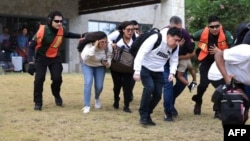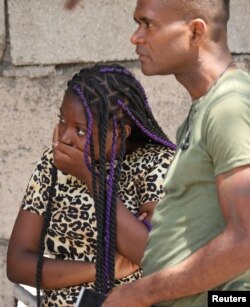Heavy gunfire erupted Monday in downtown Port-au-Prince near the National Palace in the latest act of escalating violence in Haiti.
In late February, armed gangs launched coordinated attacks demanding Prime Minister Ariel Henry’s resignation. Now, three weeks after Henry said he would resign once a transitional presidential council was in place, there are still no successors in place, provoking rival gangs to vie for control of different parts of the capital and surrounding areas.
On Monday, gunmen took control of an armored vehicle from the palace guards. Elsewhere, four people were found dead in the capital’s Petion-Ville suburb. The worsening violence has also led to attacks on the airport and main port, blocking access to key goods.
There are calls for an alternative transition method that could mitigate the unrest.
Dennis Hankins, the recently appointed U.S. ambassador to Haiti, landed in the country Monday. The United States and other nations are trying to evacuate their citizens and fortify their borders against an influx of migrants trying to escape the violence.
The Mexican government announced Monday the evacuation of 34 of its citizens from Haiti via a military vessel, citing the deteriorating security conditions in the Caribbean nation.
Cosy Joseph, president of the Gaskov Clerge Foundation, which has provided health care, education and sports opportunities in Haiti and the United States for over 20 years, said she has “never witnessed Haiti in such a state. The level of devastation is unprecedented. ... I've never felt as powerless and hopeless."
Chartered flights organized by the U.S. State Department and the Florida Department of Emergency Management have brought more than 200 people to Florida since the recent violence started. In the first three months of 2024, over 1,500 people were killed and about 60 were lynched by vigilantes, according to a U.N. report released last week.
Some information for this report came from Reuters, The Associated Press and Agence France-Presse.






